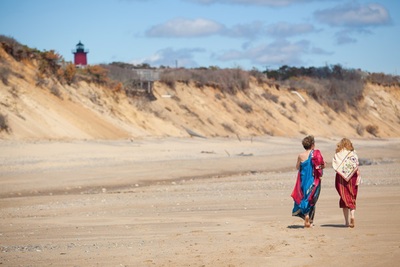Frame to Frame II: Part 2
In the face of heartache and defeat, you need to look at the big picture. That’s one takeaway from our Frame to Fame series, which follows the journeys of four directors as they navigate the tangle of film festivals, press coverage, and distribution channels, all with the hope of finding an audience for their films. Our four brave “contestants” include Alexander Janko, with his narrative feature Year By The Sea about a woman rediscovering herself at midlife; Raeshelle Cooke’s Sometime Around January, an impressionistic short exploring memories after a romantic breakup; Year-round Metal Enjoyment, Jeff Griecci’s documentary that follows the underground world of local freight train graffiti artists; and Michal Goldman, whose documentary Nasser’s Republic, The Making of Modern Egypt chronicles the life and legacy of Egyptian president Gamal Abdel Nasser.
In this second installment in the series, we checked in with the filmmakers in mid-July, to plumb the pulse of their successes, challenges, and various states of minds and hearts. What we discovered: Each of them are vulnerable artists, putting their work out there, meeting success, but also finding ways deal with setbacks to their films and blows to their egos. (Read Part 1 of the series, and additional coverage of the filmmakers, here: artnewengland.com/ed_columns/frame-to-fame/ and artnewengland.com/ed_columns/frame-to-fame-ii/.)
Alexander Janko: Year By The Sea

Celia Imrie (left, in the role of Joan Erikson) and Karen Allen (right, in the role of Joan Anderson) walk toward Nauset Light during a scene from Year by the Sea. The stunning National Seashore is why filmmaker Alexander Janko chose to shoot on Cape Cod.
Perhaps it’s the heat of summer, but one can sense some frustration coming from writer, director and composer Alexander Janko. Yes, Year By The Sea has enjoyed success. It won the Audience Award at both the Vail Film Festival and the Berkshire International Film Festival (star Karen Allen also won Vail’s Vanguard Award), and at the Newport Beach Film Festival Janko snagged “Outstanding Achievement in Filmmaking: – Screenwriting.” It will soon hopscotch the country to screen at four festivals: Rhode Island International Film Festival, Middlebury New Filmmakers Festival (in Vermont), On Location: Memphis International Film & Music Fest, and Port Townsend Film Festival in Washington state.
But after submitting to 80 festivals, and racking up almost 30 rejections — including biggies like Sundance, Tribeca, and Cannes, and local ones like Provincetown and Nantucket that would have seemed shoo-ins — sometimes Janko loses faith. “The toughest part is not feeling like an abject failure,” Janko admits. Then he’s quick to add: “That’s my story irregardless of film festival submissions. As an artist, I typically feel whatever I create is rubbish.”
To soften the negative impact, Janko seems eager to find reason why his film isn’t doing better. One theory: Year By The Sea is a “smart-house” movie and “an indie crowd pleaser” that speaks to female baby boomers. Therefore, it’s doing better at “film-loving, filmmaker friendly” boutique festivals, rather than edgy art-house fests. “The film has gotten the best response from festival programmers who are older women,” he says. Given the plot of Year By The Sea, no shock there. The curious paradox is that in a couple instances, he believes the film was “blackballed” because he’s a white, male filmmaker — despite the fact that he’s made a female-centric film, and fully backs efforts to cultivate more female filmmakers. “[That] surprised me because the film is all about supporting women,” he says. “But I get it. It’s still a man’s world and, ironically, I’m ‘one of them.’”
Meanwhile, as summer burns on, Janko’s mood swings between “discouraged” and “hopeful.” Year By The Sea will find its audience, he says. “I trust the universe.”
Raeshelle Cooke: Sometime Around January
Raeshelle Cooke’s short film has been accepted at a festival called Ozark Shorts, a free monthly short film screening series in rural Missouri, and it was nominated for Best Short Film at the Shawna Shea Film Festival, but didn’t win. Other than that, Cooke says, Sometime Around January hasn’t been accepted to any new film festivals.
Despite these hopeful signs, she’s been struggling to detach herself from suspicions of being treated unfairly. Case in point: She submitted her film to a particular festival that had accepted her work in the past. Cooke had assumed she’d built a relationship with that festival, and thought, “if they liked the last one, they would definitely like this one.” This time, they declined, even though, in her view, her film was “as good as the films they accepted.” The rejection itself didn’t bother her so much, she says. Rather, what stung was the realization that sometimes, “friendships and popularity” might trump quality. “I was ignorant to assume my work would be judged based on the content. And I was very discouraged and frustrated, and yes, angry. I admit it.” Lesson learned.
With that incident in the rear view mirror, Cooke has moved on, vowing to learn and grow from the experience. “There are other people in this world and other festivals who will judge [my work] based on content. To stay in a stagnant place means you are afraid of testing your talent outside.” She’s moved on to other projects, determined to keep working on her anthology of short films, which she hopes to release as a feature. Her latest finished film, Mt. Washington, will be part of that collection, as will her next one, His Interlude, now in pre-production. Beyonce’s Lemonade, an episodic visual album of music videos, confirmed for Cooke that a market exists for the films she likes to make.
Of course, Raeshelle Cooke doesn’t have the popularity and reach of Beyonce. But the specter of defeat doesn’t faze her. “What is failure anyway? Making a feature-length film, a film that isn’t like other features, a film that fits my unique storytelling style, a film I completed and distributed, is far from failing. It is a huge success. It would be huge for me to even complete that,” she says. “I am not afraid. As long as you are not stagnant. As long as you are growing.”
Jeff Griecci: Year-round Metal Enjoyment

Film still from Jeff Griecci’s Year-round Metal Enjoyment, 95 min.
Griecci has submitted his documentary to about a dozen festivals, and the latest news is, well, not particularly positive. Year-round Metal Enjoyment received rejections from the Maine International Film Festival and the Woods Hole Film Festival, two local festivals he’s had a history with before. Griecci found that “discouraging.”He “remains hopeful” while waiting to hear from other festivals he’s submitted to. “We’re still early in the process as far as hearing back… so we’re hanging in there.” There are no plans to change his strategy, other than intentions “to sit down and make another pass at submissions to festivals that are now opening up.”
The biggest hurdle? Time. The festival submitting process is “a whole job in its own,” he says. Being independent filmmakers, he and co-producer Ian Carlsen “have all the work on our shoulders and it’s not an easy task to take on, especially when you are simultaneously trying to ramp up future projects, and pay our bills,” Griecci acknowledges. “It’s all very educational and I know it’ll help greatly to know the process for the next time.”
In the meantime, plans are underfoot to plan a DIY Year-round Metal Enjoyment tour of various parts of the country. “Regardless of how the festivals receive our film,” he says, “we plan to get it in front of audiences the best we can.” Griecci, it seems, battles his disappointment by taking matters into his own hands.
Michal Goldman: Nasser’s Republic, The Making of Modern Egypt
Let’s end on an up note. No one was more surprised than Michal Goldman that Nasser’s Republic has been accepted by the Cairo International Film Festival. “There’s open criticism of Nasser in my film because of his rejection of democracy, and implied criticism of the present regime,” she says. “I’m thrilled they said ‘Yes.’” She’ll travel to Egypt for the festival, where she expects her cast and crew will be in attendance.
“It should be an amazing screening with lots of people who worked on the film, and are in the film, live in attendance,” says Goldman, who’s hoping for a “really intense discussion afterwards, if people feel they can speak freely. And even if they don’t, I’ll get a sense of what’s going on.”
Goldman’s other “big acceptance”: Although her documentary wasn’t accepted at Toronto’s prestigious Hot Docs Canadian International Documentary Festival, Icarus Films screened Nasser’s Republic there and inked a domestic distribution deal with Goldman. Going forward, Icarus will take on the chore of finding an audience. Goldman feels the Icarus Films coup is more a change in tactics rather than strategy. “Now Icarus Films will be submitting it to festivals in the U.S., so maybe my luck will change,” she says. “I felt a huge flood of relief, just to be able to share the work with people who have a lot of expertise.” While she’d hoped to get into Michael Moore’s Traverse City Film Festival, mainly due to Detroit’s significant Arab-American population, her goals remain the same: “Get the film shown on the big screen in front of live audiences, and then distribute it to colleges and universities, then to individuals, and then find a way to get the short version of it broadcast.”
Stay tuned for the next installment of Frame to Fame where we follow up with our four filmmakers when they are further down the road.
Ethan Gilsdorf is a frequent contributor to Art New England, an author and a writer for the New York Times, Boston Globe, Boston Globe Magazine, Boston Magazine, Salon, and Wired.
